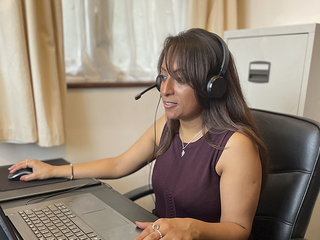How re-purposing drugs could revolutionise blood cancer treatment
Find out how re-purposing drugs could help us bring new treatments to people with blood cancer, faster.
Over 70% of cases of acute myeloid leukaemia (AML) are present in people over the age of 60. Due to their age, many of these people are unable to receive chemotherapy, an important treatment for the disease. For these people, we urgently need kinder treatments. This need to find new treatments isn’t an isolated issue in blood cancer and for others, such as those with myelodysplastic syndrome (MDS), there are also limited treatment available. Blood Cancer UK funded researchers are coming up with innovative solutions to try and find new ways to treat these diseases.
Drug repurposing
One way to find new treatments and get them to patients quickly is to repurpose existing drugs and see whether they work for other diseases. Repurposing drugs instead of creating new ones has many benefits. It means we already have information on how a drug can be given safely to be people, which speeds up the process of getting a new treatment to a patient.
Are there existing drugs that can help people with AML or MDS?
Previous research has shown that the drugs bezafibrate (a cholesterol-lowering drug) and medroxyprogesterone acetate (a type of contraception), “BaP” when put together, benefit people with AML who are unable to receive chemotherapy.
However, when given to people who were elderly and more frail, the drug combination could only be given at a low dose, otherwise it caused unwanted side effects. As the treatment had to be given at such a low dose, it was not as good as destroying cancer cells. In comparison, this drug combination has been shown to be well tolerated and successful at destroying cancer cells in children when they receive a higher dose.
In a recent study, Professor Chris Bunce, Dr Farhat Khanim and their team looked at the effect of adding an additional drug to the BaP treatment and looked at what this did to AML cells in the lab. They found that adding valproic acid, a common drug used for people with epilepsy, could increase the anti-cancer effect of the other drugs, without having to increase the dose of BaP.
They now want to test this treatment, known as VBaP, in elderly people with AML to see how much benefit they get from the treatment.
The team also want to trial this drug combination in people with myelodysplastic syndrome (MDS), a blood cancer that can progress onto AML. They think the treatment may improve effects of the disease for people with MDS and may also reduce the number of people who go on to develop AML.
What are we doing about this?
Thanks to generous donations from The Jon Moulton Charity Trust, Blood Cancer UK are funding a first-of-its-kind clinical trial called Repair-MDS which will test this drug combination and see if it’s beneficial to people with MDS, a disease which affects ~2,000 people each year. The trial will also look at another drug, used currently for the treatment of endometriosis, to see if this drug may also be repurposed to benefit people with MDS. Unfortunately, there are very limited treatment for people with MDS and most have to rely on frequent blood transfusions to try and keep their disease under control.
The hope is that this trial will limit the progression of MDS and prolong survival for people with this disease. It’s urgent we find new treatments for people with MDS and this treatment could quickly bring benefit to people with the disease, as we already know the drugs are safe.
A big thank you to MDS-UK, and the patients involved in shaping the REPAIR-MDS trial.

Worried about anything or have questions?
If you need someone to talk to, please don't hesitate to contact our Support Service by phone or email.
